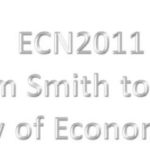 Sadly we had our first instance of of marking being lost using the Turnitin mobile application for iPad yesterday, which resulted in a significant loss of work. Unfortunately, all the data was lost before we could gather a complete understanding of the problem, but it seems to relate to the application refusing to sync papers because of a lack of internet connectivity, despite the iPad being able to access mail and web sites. There is nothing on the Turnitin Self-Service Help Center to indicate that this is a common problem – it might even relate to our local wi-fi provision or an iPad setting – so Learntech will continue to encourage the apps continued use, but with care.
Sadly we had our first instance of of marking being lost using the Turnitin mobile application for iPad yesterday, which resulted in a significant loss of work. Unfortunately, all the data was lost before we could gather a complete understanding of the problem, but it seems to relate to the application refusing to sync papers because of a lack of internet connectivity, despite the iPad being able to access mail and web sites. There is nothing on the Turnitin Self-Service Help Center to indicate that this is a common problem – it might even relate to our local wi-fi provision or an iPad setting – so Learntech will continue to encourage the apps continued use, but with care.
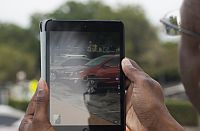 We do know that changing the iPad settings (moving from ‘TurnitinUK’ to ‘Turnitin’) will irretrievably destroy any local data stored on the iPad. We suggest – if at all possible – synchronizing marking more regularly, particularly early in the process.
We do know that changing the iPad settings (moving from ‘TurnitinUK’ to ‘Turnitin’) will irretrievably destroy any local data stored on the iPad. We suggest – if at all possible – synchronizing marking more regularly, particularly early in the process.
If you do encounter a problem, help us troubleshoot this further with the Turnitin support staff, please send us the log file.
To find the log file, open the Turnitin App and then press and hold the “Help” link at the bottom of the screen. The “Turnitin Mobile App Logs” appears. Copy the log information and then paste it into an email to learntech@northampton.ac.uk – you can send this directly to the Turnitin support email address using the ‘send’ button if you wish, but do let us know if you have done this. Then contact Learntech immediately on x2696 where we will give this the highest priority.
Turnitin UK have been in touch with us and are in the process of improving their documentation and FAQs relating to synchronization problems as a result of this issue. They are also investigating a way to warn users not to change their iPad settings. They have been extremely co-operative and have assured us of their commitment to dealing with problems as quickly as possible.
We are very grateful for the affected user’s patience, understanding and feedback on the problem – if this prevents it happening to another user it is of some comfort, at least.
 There seem to be more and more staff at Northampton getting their hands on a mobile device. It’s either something they’ve bought themselves, or they are borrowing an iPad or iPod from stock purchased by their academic school. This is great news. We think these devices have real value as tools for learning and teaching, which is why we’ve started our monthly App Cafe sessions.
There seem to be more and more staff at Northampton getting their hands on a mobile device. It’s either something they’ve bought themselves, or they are borrowing an iPad or iPod from stock purchased by their academic school. This is great news. We think these devices have real value as tools for learning and teaching, which is why we’ve started our monthly App Cafe sessions.
On the first Monday of the month between 1-2pm in the tPod at Park Campus, we come together to share apps and examples of good practice, drink coffee and even snaffle a pastry or two. The agenda for these sessions is intentionally loose. We don’t know what level people are at, some might be very comfortable with their own device, others are totally new to mobile devices. We want to try and focus on a single app each session and look at the learning angle on it. We’ll bring along some of our devices for staff to play with, and make the sessions practical and active.
Our first session focused on iPad Essentials, which was hard to nail down as there are so many apps to choose from, but we had a go and here are links to our small selection:
Accessing your University emails from your mobile is something we find essential, it’s not strictly learning or teaching but it’s pretty much an essential in our eyes.
CALENDAR
When you set up an email account, you can also choose to sync your Outlook calendar to your mobile, which is something we’d find hard to live without. The thing to be aware of with both email and your calendar is to if it’s not your machine then you need to delete your account when you’re finished with it. Speak to use if you need help setting it up.
You can use iNorthampton to find staff in the directory, check timetables, browse the library catalogue and access your NILE modules via the Blackboard Mobile Learn app. It even has a map of the campus if you ever get lost on the way to class!
More and more staff are recording their lectures for students to access outside of class and this app is a great way to view many of the excellent video recordings available.
Finally, my favourite. Flipboard is a superb way to pull together into one place all the latest news from websites you’d like to follow. It’s hard to find time at your PC to trawl through dozens of websites, twitter feeds and personal blogs which focus on your teaching interests. Flipboard brings all these sources together and can keep you updated on professional issues, relevant discussions and current trends. If you’ve been avoiding Twitter then get an account, install Flipboard and you’ll never look back.
Okay, that’s all for now. There are so many other apps we could have chosen, but I wanted to keep the list short. Apple produce a range of apps which include word processing and presentation tools, and though they’re not free like the ones I’ve listed, they are great ways to stay productive.
Come along to an App Cafe, if you have time, or bookmark our blog for updates if you’re not free on each first Monday of the month. We are also happy to run small school-focused group sessions if you’d prefer so get in touch with us at learntech@northampton.ac.uk.
Al
We meet on the first Monday of every month from 1-2pm, in the T-Pod, second floor of Park Library. The provisional programme is as follows:
- November – Mobile Essentials
- December – Assessments
- January 2014 – Presentation Tools
- February – Communication
- March – iNorthampton / Mobile NILE
- April – Focus on Audio-Visual
- May – Collaboration
- June – Student Feedback
Following up on their piece on free picture resources, Zembl have added this article which introduces a number of video sources that would be suitable for material that could be safely used within a Creative Commons resource. Some are available as animated gifs (which is what the image to the left is), which are very simple to add – even directly into NILE.
Many are quite short clips that could be used as looping backgrounds or for ‘audio only’ sections. There are also many that are suitable for using as overlays on existing video or as a background for ‘green screen’ recordings.
LearnTech have a green screen available for recordings if you are interested in putting together your own masterpiece!
The New Year brings the new version of Box of Broadcasts with a host of new features:
- it now supports non-Flash web browsers by using an HTML5 player – great news for iPad/iPhone users!
- transcripts appear next to the video – excellent for international students and for those with hearing difficulties
- a better programme guide with a wider range of channels, including the facility to request material from the BBC Archive (takes a little time to transcode, but very much like eternally available iPlayer content)
However, there have been some changes in the embed code that is provided – although existing embedded videos are not affected. However, the ‘need to log in’ warning isn’t there any more, so you may need to add this as text to existing content that still in use that doesn’t already have a warning like this.
An ‘iframe’ version of the embed code is no longer available, having been replaced with a ‘script’ code. Sadly this code will be automatically removed by the Blackboard text editor as we don’t allow scripts to be run directly in NILE.
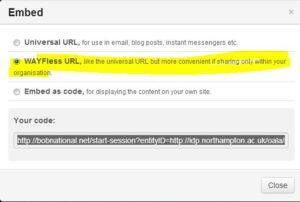 The suggested way to link to BoB videos on NILE is to use a Weblink that uses the ‘WAYFless URL’ as its URL. The advantage of this method is that students are prompted to login (if they are not logged in to BoB already) before being redirected to the video. This avoids having to remind them to log in to BoB first.
The suggested way to link to BoB videos on NILE is to use a Weblink that uses the ‘WAYFless URL’ as its URL. The advantage of this method is that students are prompted to login (if they are not logged in to BoB already) before being redirected to the video. This avoids having to remind them to log in to BoB first.
If is still possible to use the embedded iframe technique (via ‘insert media’ icon on the editor) providing the link is changed from ‘http’ to ‘https’. The WAYFless URL would be the one to use for the reason cited above. You need to set the iframe width to at least 900 px to avoid cropping off the transcript box. As iframes containing external web site data are becoming less and less acceptable in new browsers, this probably isn’t the best way to go in the long term.
Please speak to your LearnTech support if you have any difficulties, but be aware that this new site is new to us too so it would be worth checking the BoB help information first.
What do you do when you have a very dry topic to teach and the snores from the lecture theatre are drowning out your words?
Kevin Deane, a new Lecturer in International Development in NBS, faced exactly that problem, some 5-6 weeks into the term. Feedback from the students was clear – “we are bored by this and we are not engaging”. It was time for a radical rethink.
Kevin and I spent about two hours batting ideas back and forth over how to help his class see how the opinions of these long dead men could be relevant to them as 21st century students of economics. I had made a choice not to lecture a group of postgraduate students during a three hour session but instead to spend that face-to-face time on the application rather than the acquisition of knowledge. Could a similar approach be utilised in this context?
The answer came in the form of an academic poster exhibition with each group producing a poster on a different economist which they had to present at an exhibition at the end of term to fellow students and staff within NBS. They also had to explore the relevance of each economist – did they agree with their theories; were their opinions wrong? This had the effect of ensuring a higher level of participation than might otherwise have been the case, given that the poster was not being assessed.
The subsequent 4 weeks of lectures were therefore abandoned and the time allocated to group work on the posters. In spite of some initial discontent Kevin made it clear to the students that this was simply a different approach to teaching and that the students would still be expected to attend and participate. Success was also encouraged by ensuring that students had weekly interim goals and deadlines to work to.
At the exhibition, it was evident that the students I spoke to had engaged with the material and enjoyed finding out about their allocated economist. They had also grasped the concept of what an academic poster was about! A number of staff from NBS were present to ask questions and to help Kevin judge the best poster(s) – three prizes were awarded in the end.
On reflection, Kevin will definitely repeat this approach for this module, but will add an element of assessment to further increase participation and engagement. To read more about the what’s, why’s and wherefore’s, please read his case study – Kevin Deane – Histor.
For now though, this process of resuscitating the wrong opinions of dead men shows that the theories really do live on.
 The latest roundup of LearnTech news is now available
The latest roundup of LearnTech news is now available
 All sessions have now been mapped to the UK Professional Skills Framework as attendees may include these as evidence for Fellowship applications or ongoing professional development.
All sessions have now been mapped to the UK Professional Skills Framework as attendees may include these as evidence for Fellowship applications or ongoing professional development.
The list below represents the scheduled sessions however they can be run as a bespoke session for three or more staff at any mutually convenient time.
SaGE Essentials
(Link to the UK PSF – A3, K4)
This session is for both staff who are new to the Submission and Grading Electronically (SaGE) Project and those who need a refresher on the current process. The event will cover the SaGE workflow including marking in Turnitin; passing grades to the NILE grade centre; downloading grades to send to the SATs; and working with the External Examiner. (12 places). All sessions will be run in the Tpod at Park Campus
| Date | Time |
| 10th January | 9:30-12:00 |
| 14th January | 2-4:30 |
| 23rd January | 9:30-12:00 |
| 28th January | 2-4:30 |
| 12th February | 9:30-12:00 |
| 24th February | 2-4:30 |
| 13th March | 2-4:30 |
| 26th March | 9:30-12:00 |
Register on https://www.eventbrite.co.uk/e/sage-essentials-tickets-9654618223
Adding value to your SaGE experiences
(Link to the UK PSF – A3, K4, K5)
Available for staff who already have SaGE experience but would like to attend a small group session to review their current processes and make sure that the most up to date processes and recommendations are being used. The session may look at aspects of the full SaGE workflow (including grades to SATs, Smart Views for the External and external moderation). All sessions will be run in the Tpod at Park Campus
(Limited to 4 places)
| Date | Time |
| 20th February | 9:30-11:30 |
| 18th March | 2-4:00 |
Register on: https://www.eventbrite.co.uk/e/adding-value-to-your-sage-experiences-tickets-9654762655
SaGE – Providing quality feedback using rubrics
(Link to the UK PSF – A3, K4, V2)
A dedicated session for those who have already attended the SaGE Essentials session and are confident with the basic SaGE workflow. The event will focus on both Turnitin and NILE rubrics. Rubrics are useful for various styles of marking and can be used for qualitative and quantitative feedback.(12 places). All sessions will be run in the Tpod at Park Campus.
| Date | Time |
| 13th February | 2-4 |
Register on https://www.eventbrite.co.uk/e/sage-providing-quality-feedback-using-rubrics-tickets-9654814811
Using the NILE assignment submission area and managing groups
(Link to the UK PSF – A3, K4, V1)
A dedicated session for those who have already attended the SaGE Essentials session and are confident with the basic SaGE workflow. This event will focus on the NILE assignment submission area which may be used for both individuals and groups. (12 places). All sessions will be run in the Tpod at Park Campus
| Date | Time |
| 23rd January | 2-4 |
NILE Essentials – Making the most of your NILE site
(Link to the UK PSF – A4, K4, V2)
This session will introduce the NILE sites which are being used for all module and course areas. Find out the Top Ten most common mistakes with existing NILE sites and how to avoid them to improve the student experience. Attendees will develop confidence with working in their NILE area to add new and exciting content.(12 places). All sessions will be run in the Tpod at Park Campus.
| Date | Time |
| 18th February | 2-4 |
Register on https://www.eventbrite.co.uk/e/nile-essentials-making-the-most-of-your-nile-site-tickets-9654895051
NILE – Encouraging collaboration and NILE interaction using Blogs, Discussion Boards, Journals and Wikis
(Link to the UK PSF – A2, K2, V1)
This session will allow participants to explore the Blogs, Journals, Discussion Boards and Wikis tools inside NILE which encourage greater collaboration.(12 places). All sessions will be run in the Tpod at Park Campus.
| Date | Time |
| 4th March | 2-4 |
NILE – Developing assessments using Tests and Pools
(Link to the UK PSF – A3, K4)
This session will explore the test, survey and question pool tools within NILE. There is a range of functionality which provides the option of auto marked formative and summative assessment with question choices like multiple choice and fill in the blanks. These tools may be used with features such as adaptive release and the performance dashboard to allow greater student interaction with content and a higher level of tutor understanding of student engagement.(12 places). All sessions will be run in the Tpod at Park Campus.
| Date | Time |
| 13th March | 10-12 |
Register on: https://www.eventbrite.co.uk/e/nile-developing-assessments-using-tests-and-pools-tickets-9654949213
NILE – Understanding and working with the NILE Grade Centre
(Link to the UK PSF – K4, K5)
This session will explore the NILE Grade Centre where all grades created by students within NILE are held and managed. In addition to being the link between NILE and the Student Record System, this tool allows you to manage the student view of grades, collate grades between assignments and manage grades and feedback on physical artefacts and performances/presentations.(12 places). All sessions will be run in the Tpod at Park Campus.
| Date | Time |
| 30th January | 2-4 |
Register on: https://www.eventbrite.co.uk/e/nile-understanding-and-working-with-the-nile-grade-centre-tickets-9654971279
Recording lectures and creating videos for students using Panopto
(Link to the UK PSF – A2, K2, K4)
Find out about the most recent advances which will allow you to capture individual student presentations or whole lectures. The session will provide an introduction to Panopto. (12 places). All sessions will be run in the Tpod at Park Campus.
| Date | Time |
| 13th February | 10-12 |
Register on: https://www.eventbrite.co.uk/e/recording-lectures-and-creating-videos-for-students-using-panopto-tickets-9655007387
Working with sound and video using Kaltura
(Link to the UK PSF – A2, K2, K4)
Find out about the most recent advances which will allow you to upload and share videos using the tool embedded in NILE (Kaltura). This tool may be used as part of the SaGE process to allow for video submissions.(12 places). All sessions will be run in the Tpod at Park Campus.
| Date | Time |
| 17th March | 10-12 |
Register on: https://www.eventbrite.co.uk/e/working-with-sound-and-video-using-kaltura-tickets-9655029453
Making best use of smartboards
(Link to the UK PSF – A2,K2,K4)
Many opportunities now exist to increase the amount of student interaction within traditional lectures. Smartboards are located in many of the teaching spaces but are often only used to display PowerPoints. This event will introduce the range of tools which allow the Smartboard to ‘come alive’. This event will provide practical experience on using these tools.(12 places). All sessions will be run in the Tpod at Park Campus.
| Date | Time |
| 16th January | 2-3:30 |
Register on: https://www.eventbrite.co.uk/e/making-best-use-of-smartboards-tickets-9655061549
Increasing in class session interaction using the voting handsets
(Link to the UK PSF – A2, K2, V2)
Many opportunities now exist to increase the amount of student interaction within traditional lectures. Voting handsets may be used to increase the amount of feedback students provide within sessions. This event will provide practical experience on using these tools.(12 places). All sessions will be run in the Tpod at Park Campus.
| Date | Time |
| 27th February | 2-3:30 |
Register on: https://www.eventbrite.co.uk/e/increasing-in-class-session-interaction-using-the-voting-handsets-tickets-9655091639
All of the sessions above are also available on request for bespoke events (such as for Subject group training). Please contact your Learning Technologist or mail LearnTech@northampton.ac.uk for details on arranging these.
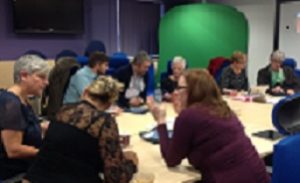 Monday saw the second iteration of the App Cafe – a new drop-in lunchtime session in the Tpod, run by the Learning Technology team and looking at how we can use apps in the learning and teaching context. This week’s starters included a second look using Dropbox for Cloud storage and some syncing issues, but the main course was a meaty demonstration of the new Turnitin app for iPad.
Monday saw the second iteration of the App Cafe – a new drop-in lunchtime session in the Tpod, run by the Learning Technology team and looking at how we can use apps in the learning and teaching context. This week’s starters included a second look using Dropbox for Cloud storage and some syncing issues, but the main course was a meaty demonstration of the new Turnitin app for iPad.
The most difficult thing that anyone will find with this app is the initial syncing of NILE modules to the iPad, but that is only because it involves an additional step in the SaGE workflow.
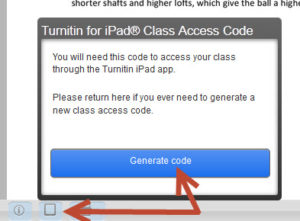
Syncing involves generating a class code which is possible using your desktop pc / laptop from within one of the Turnitin papers on the module you are marking. Simply click on the ‘new’ iPad icon at the bottom left of the screen and then Generate code. Once you have the 16-letter code you need to enter it into the app. You don’t need to login with your Turnitin username as most staff don’t have one of this (it isn’t your NILE login!) The code will link that module to your iPad and then you are ready to go.
If you are used to using an iPad then this app is very intuitive – so intuitive that we don’t think you need a help guide on it! Just have a go and see how you get on. The functionality is better than that on a pc as you can take full advantage of iPad features like touch screen technology to add or create a quick mark, Siri to enter the text both 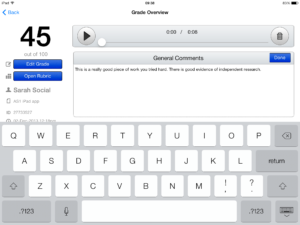 for existing and new Quick Marks, longer in-text comments or the full text comment at the end. Voice comments as found in the desktop version of Turnitin are still possible but obviously Siri makes using voice much quicker and easier in the standard QM/text comments as well. So even typing may be a thing of the past!
for existing and new Quick Marks, longer in-text comments or the full text comment at the end. Voice comments as found in the desktop version of Turnitin are still possible but obviously Siri makes using voice much quicker and easier in the standard QM/text comments as well. So even typing may be a thing of the past!
One other major advantage of the app is that once you have downloaded the papers you can mark offline. So no more paying for wi-fi so that you can do your marking when on holiday, or when abroad working as International Flying Faculty! Simply sync, download, mark and then re-sync when you next have a (free) signal.
Roshni Khatri, Senior Lecturer in Occupation Therapy, has been using the app for a while now and has this to say about it:
“The Turnitin App gives me the flexibility to mark where and when I want to without the need for a WIFI connection. The user friendly interface allows me to give feedback, use comments, rubrics and sync grades without any fuss. Makes marking easier but enables tutors to continue giving high quality feedback!”
The Turnitin iPad app is honestly the best thing since sliced bread – and you won’t find that on the menu at the App Cafe!
The App Cafe is on the 1st Monday of every month, from 1-2 in the TPod, Park Library. Next meeting: 6th January 2014. Bring your lunch and your mobile device (this isn’t just about iPads you know!) We will provide coffee and tea.
Nominations for the Edublogs Awards from the University of Northampton:
Best new blog
http://mypad.northampton.ac.uk/iodim/ Images of Disability (Kyffin Jones).
New Blog created in November 2013 for Undergraduate module examining perceptions of disability. Students were asked to source images of disability portrayed in the Media and add as a post, then use the Class Blog to support discussion. This became even more meaningful when Dominic Hyams, whose YouTube video ‘Crip on a Trip’ was posted on the Blog, was invited in to meet the class, to discuss and challenge their own perceptions.
Best ed tech / resource sharing blog
http://mypad.northampton.ac.uk/resourcebank
Teaching ideas for early years and primary (fantastic resources created and shared by trainee teachers).
Best educational use of audio/video/visual/podcast
https://vimeo.com/64793013
“Blogging for Students”– A short video by the School of Education. Teaching Students are given their chance to describe how well and how effectively they feel blogging has become a way to record and assess their work.
Best individual blog
http://samuelsbay.wordpress.com
One of the Education students (Julian Keith – Researcher in Training) who has carried on blogging since he left the course
Recent Posts
- Blackboard Upgrade – January 2026
- Spotlight on Excellence: Bringing AI Conversations into Management Learning
- Blackboard Upgrade – December 2025
- Preparing for your Physiotherapy Apprenticeship Programme (PREP-PAP) by Fiona Barrett and Anna Smith
- Blackboard Upgrade – November 2025
- Fix Your Content Day 2025
- Blackboard Upgrade – October 2025
- Blackboard Upgrade – September 2025
- The potential student benefits of staying engaged with learning and teaching material
- LearnTech Symposium 2025
Tags
ABL Practitioner Stories Academic Skills Accessibility Active Blended Learning (ABL) ADE AI Artificial Intelligence Assessment Design Assessment Tools Blackboard Blackboard Learn Blackboard Upgrade Blended Learning Blogs CAIeRO Collaborate Collaboration Distance Learning Feedback FHES Flipped Learning iNorthampton iPad Kaltura Learner Experience MALT Mobile Newsletter NILE NILE Ultra Outside the box Panopto Presentations Quality Reflection SHED Submitting and Grading Electronically (SaGE) Turnitin Ultra Ultra Upgrade Update Updates Video Waterside XerteArchives
Site Admin



